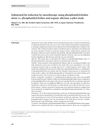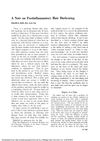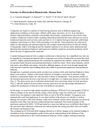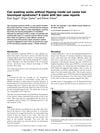 2 citations,
September 2021 in “Orphanet Journal of Rare Diseases”
2 citations,
September 2021 in “Orphanet Journal of Rare Diseases” People with hypohidrotic ectodermal dysplasia are more likely to experience long-term fatigue and hair loss after COVID-19.
 September 2009 in “Pediatric Dermatology”
September 2009 in “Pediatric Dermatology” UVB is good for a skin condition in Asian kids, a lotion works for head lice, a drug helps with a skin blistering disorder, a foam reduces itchiness in skin inflammation, birthmarks can be more widespread, and criteria for a neurocutaneous disorder were agreed upon.
 202 citations,
June 2005 in “Aaps Pharmscitech”
202 citations,
June 2005 in “Aaps Pharmscitech” Lecithin organogels could be good for applying drugs to the skin because they are stable, safe, and can improve drug absorption.
[object Object]  45 citations,
January 1998 in “Dermatology”
45 citations,
January 1998 in “Dermatology” Some skin conditions look like acne but are caused by drugs, and they usually get better when the drug is stopped.
 23 citations,
November 2007 in “Journal of cosmetic dermatology”
23 citations,
November 2007 in “Journal of cosmetic dermatology” Both mesotherapy treatments reduced under-chin fat equally and were safe with mild side effects.
 June 2022 in “Asian Pacific journal of health sciences”
June 2022 in “Asian Pacific journal of health sciences” Ayurvedic treatments like bloodletting, herbal packs, and medicated liquid flow over the head are a safe and effective alternative for hair loss.
 1 citations,
August 2017 in “Journal of food and nutrition research”
1 citations,
August 2017 in “Journal of food and nutrition research” The herbal supplement increased hair thickness and reduced scalp oiliness in women.
 8 citations,
October 2022 in “International Journal of Molecular Sciences”
8 citations,
October 2022 in “International Journal of Molecular Sciences” Self-amplifying RNA could be a better option for protein replacement therapy with lower doses and lasting effects, but delivering it into cells is still challenging.
September 2024 in “Journal of Ayurveda and Integrative Medicine” Ayurvedic treatments can improve symptoms and quality of life for systemic sclerosis patients.
 9 citations,
June 1959 in “Archives of dermatology”
9 citations,
June 1959 in “Archives of dermatology” Hair can darken after inflammation and then return to its original color.
1 citations,
September 2021 in “Frontiers in genetics” A genetic mutation in the DCAF17 gene caused Woodhouse-Sakati syndrome in a Chinese patient from a related family.
 7 citations,
June 1994 in “Journal of The American Academy of Dermatology”
7 citations,
June 1994 in “Journal of The American Academy of Dermatology” Obesity may contribute to female hair loss by increasing male hormone levels that affect hair follicles.
 April 1974 in “Pediatric Research”
April 1974 in “Pediatric Research” The Naked (N) trait in mice is linked to lower glycine and tyrosine in hair proteins.
 127 citations,
June 2008 in “British Journal of Clinical Pharmacology”
127 citations,
June 2008 in “British Journal of Clinical Pharmacology” Low doses of some substances can be beneficial, while high doses can be harmful or toxic.
[object Object]  85 citations,
March 2012 in “Revista Brasileira de Farmacognosia”
85 citations,
March 2012 in “Revista Brasileira de Farmacognosia” The genus Sophora has compounds with potential health benefits and could lead to new drugs, but more research is needed to understand their effects and safety.
 51 citations,
October 1981 in “British Journal of Dermatology”
51 citations,
October 1981 in “British Journal of Dermatology” Some patients developed skin inflammation after obesity surgery, and a medication called dapsone helped treat it.
 9 citations,
April 1976 in “Archives of Dermatology”
9 citations,
April 1976 in “Archives of Dermatology” Iodides can cause skin issues like acne and other health problems.
 June 2015 in “Journal of the turkish academy of dermatology”
June 2015 in “Journal of the turkish academy of dermatology” Eating the right foods is important for skin health and can help treat some skin conditions.
 July 2011 in “Microscopy and microanalysis”
July 2011 in “Microscopy and microanalysis” Human hair's structure makes it tough and resistant to breaking.
 431 citations,
October 2008 in “Current Medicinal Chemistry”
431 citations,
October 2008 in “Current Medicinal Chemistry” Coumarin derivatives show promise as anti-estrogenic agents for treating breast cancer, with some in clinical trials.
 68 citations,
March 2008 in “Experimental dermatology”
68 citations,
March 2008 in “Experimental dermatology” The new assay can track and measure melanosome transfer between skin cells, confirming filopodia's role in this process.
 53 citations,
October 1978 in “Archives of dermatology”
53 citations,
October 1978 in “Archives of dermatology” Zinc supplements can resolve skin issues caused by zinc deficiency.
 46 citations,
September 2014 in “Steroids”
46 citations,
September 2014 in “Steroids” Plant steroid hormones show growth, health, and medicinal benefits in various organisms, including potential for treating diseases.
 40 citations,
August 2018 in “Skin appendage disorders”
40 citations,
August 2018 in “Skin appendage disorders” Some alternative treatments for hair loss might work, but more research is needed.
 35 citations,
January 1996 in “Dermatologic clinics”
35 citations,
January 1996 in “Dermatologic clinics” Tinea capitis is a common scalp infection causing hair loss, mostly in young children.
 12 citations,
August 2017 in “Archives of Pharmacal Research”
12 citations,
August 2017 in “Archives of Pharmacal Research” Lecithin-based microparticles can deliver minoxidil for hair growth effectively with less skin irritation.
 8 citations,
May 2022 in “International journal of nanomedicine”
8 citations,
May 2022 in “International journal of nanomedicine” Lecithin-encapsulated resveratrol nanoparticles could be a safe and effective anti-cancer treatment.
 8 citations,
October 2017 in “Dermatology practical & conceptual”
8 citations,
October 2017 in “Dermatology practical & conceptual” A spermidine-based supplement may help hair grow longer by keeping it in the growth phase.
 8 citations,
June 2016 in “Journal of Pediatric Orthopaedics B”
8 citations,
June 2016 in “Journal of Pediatric Orthopaedics B” Washing baby socks without flipping them inside out may increase the risk of Hair Tourniquet Syndrome.
 6 citations,
January 2010 in “Springer eBooks”
6 citations,
January 2010 in “Springer eBooks” SA linked to mitochondrial issues and oxidative stress, while AGA involves disrupted hair growth genes.



























